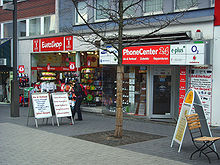Variety store
![]()
This article or subsequent section is not sufficiently supported by evidence (e.g., anecdotal evidence). Information without sufficient evidence may be removed in the near future. Please help Wikipedia by researching the information and adding good supporting evidence.
![]()
This article or paragraph presents the situation in Germany. Help describe the situation in other countries.
A special item market is a form of retail operation characterized by a constantly changing assortment from the low-price sector. They are also colloquially referred to as junk shops.
Small special item markets in city centres are often run by individual entrepreneurs. However, some special item markets are also operated as supra-regional retail chains, supplied from huge central warehouses. Supra-regional retail chains include Tedi, Thomas Philipps, Schum EuroShop, Pfennigpfeiffer and Mäc-Geiz. Another characteristic of special item markets is that the employees often work in the low-wage sector.

A cheap shop in the city centre of Bochum
Assortment
In contrast to discounters, special item markets often do not have any core articles permanently in their assortment. A characteristic feature is usually the extensive absence of food ("non-food"). Typical assortments are low-priced household articles, low-quality tools, fashion accessories, decorative articles, stationery. The assortment depth is usually low. In contrast to discounters, which today often even offer goods in the three-digit euro price range at favourable conditions, special item markets are generally limited to low-priced product ranges (between 99 cents and well below a hundred euros).
Location and appearance
Special item markets are a manifestation of so-called downtrading, i.e. the increase in ever cheaper and lower-quality goods on offer in the course of the "desolation" of city centres and the migration of retail trade to greenfield sites. They make use of vacant shop premises with reduced rents, often in B locations in pedestrian zones, or vacant commercial properties and warehouses on the outskirts of towns with favourable rents. Due to the increasing crisis of the inner-city retail trade in recent years, special item markets can sometimes also be found in better inner-city locations, especially where a property has to be refurbished or converted before it can be used again. Here, special item markets often establish themselves as interim users until they are used for other purposes.
The design of the stores is usually very simple in accordance with the range of goods and the location; decorations or a more elaborate presentation of the goods is usually dispensed with. In the case of shops operated by sole traders, the shop fittings often have a rather improvised character in that the premises have hardly been renovated or shop fittings from previous tenants are simply reused.
Search within the encyclopedia